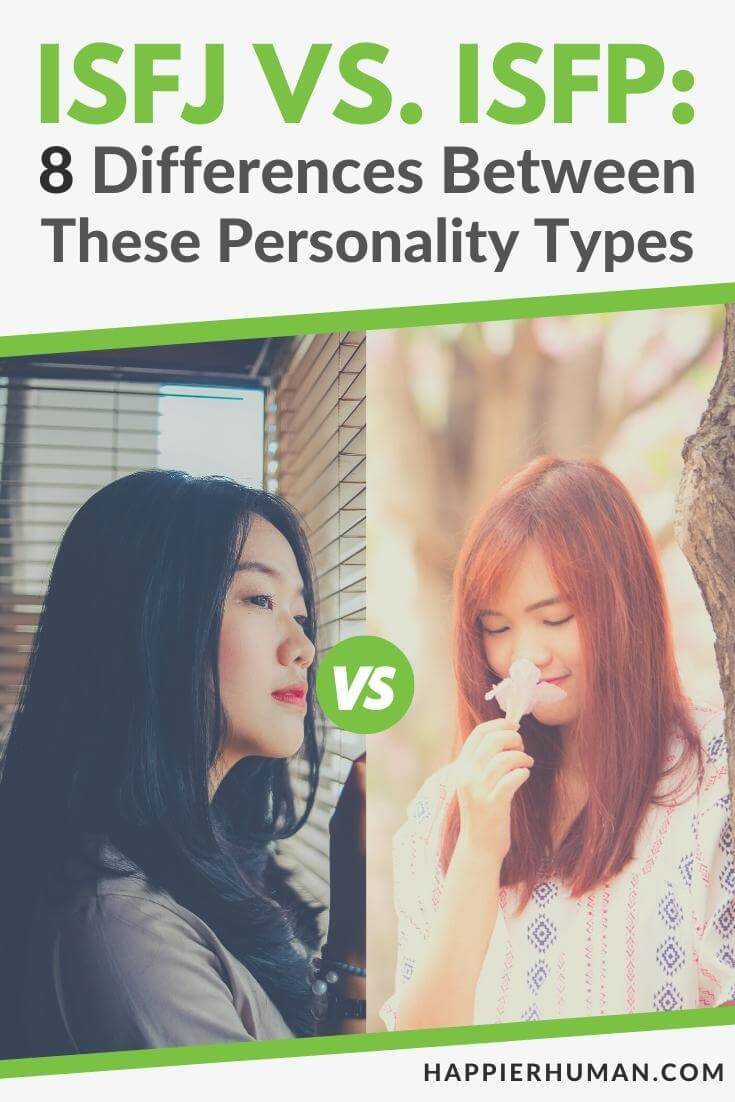ISFJs and ISFPs are both reserved, practical, and emphatic. You may think these two personalities are pretty similar if you're unfamiliar with different personality types. However, while it’s true that ISFJs and ISFPs have a lot in common, they still have different characteristics.
This article will shed light on the ISFJ vs. ISFP debate and help you understand their strengths and weaknesses.
What Is the ISFJ Personality Type?
The ISFJ is one of the 16 personality types based on the Myers-Briggs Type Indicator (MBTI) theory. The theory proposes that our seemingly random behavior is relatively consistent and orderly.
ISFJ is an acronym for the four characteristics that best describe this personality type:
ISFJs are also known as defenders. They are hardworking, loyal, and have a deep sense of responsibility to the people around them, whether family, friends, or coworkers. You can count on ISFJs to remember anniversaries, birthdays, and the seemingly insignificant things you told them long ago.
While they are very supportive and attentive, ISFJs don’t seek recognition for their actions. Instead, they prefer staying behind the scenes. Defenders are caring, but they also have highly-developed analytical skills. They may be reserved at first, but they possess strong social skills and enjoy spending time with the people close to them.
ISFJs have these distinctive traits:
Like other personality types, ISFJs have several weaknesses:
What Is the ISFP Personality Type?
The four core values that describe ISFPs are:
Also called adventurers, ISFPs are unique, curious, and eager to take on new challenges. Their exploratory nature often goes hand in hand with having an array of interests and passions. Everything adventurers do reflects their personalities, from how they spend their free time to how they dress.
ISFPs are adaptable and flexible; they don’t mind last-minute changes to their schedule and don’t depend on a routine. Consequently, people with this personality type are open-minded and tolerant. They love meeting new people and don’t mind someone with opposing attitudes and beliefs. Due to their flexible nature, adventurers can often change their opinions.
They believe in second chances and aspire to have the freedom to live as they want, without judgment.
ISFPs’ strengths are:
Their most notable weaknesses are:
What Do ISFJ and ISFP Personalities Have in Common?
One of the main qualities ISFJ and ISFP personalities have in common is introversion. They enjoy spending time alone, with close family or friends. Due to their nature, both ISFJ and ISFP don’t enjoy being the life of the party.
However, remember that just because they are introverted doesn’t mean ISFJs and ISFPs don’t like to socialize. Both personality types enjoy deep connections and meaningful conversations.

Since they’re introverted, ISFjs and ISFPs are more behind-the-scenes operators than leaders. This allows them to support others and share interesting ideas without the burden of being the one in charge.
ISFJs and ISFPs are sensing and feeling types, meaning both are driven more by emotions than reason. They are practical, sympathetic, and tolerant. Both types enjoy helping others and trying to understand their points of view.
Another quality ISFJ and ISFP personalities have in common is fierce loyalty. They tend not to give up on relationships even when they’re not good for them.
8 Key Differences Between the ISFJ and ISFP Personality Types
While these two types share numerous qualities, they also differ in many aspects. So first, let’s look into the main ISFJ vs. ISFP differences.
1. ISFPs Are More Creative
Both ISFPs and ISFJs have excellent attention to detail. However, ISFJs are more practical and factual. They are goal-oriented and try to develop logical, practical ideas to help them fulfill their ambitions.
On the other hand, one of the core values of the ISFP personality type is creativity. As a result, they have a unique way of perceiving the world around them and an artistic nature that ISFJs often can’t understand.
2. ISFJs and ISFPs Have Different Triggers of Stress
Another difference between the two personality types lies in the triggers of stress. What may cause stress and anxiety for someone with an ISFP personality type could be perfectly normal and even desirable for someone with an ISFJ personality.
Common stress triggers for ISFJs are repeated or harsh criticism, thinking about or discussing theoretical or conceptual ideas, chaos and disorder, and a lack of organization and reliability. They can also feel stress when forced to change their usual routine or step out of their comfort zone.
What seems to be comforting for ISFJs often upsets ISFPs. They feel stressed when they have to comply with repetitive schedules, strict rules, regulations, and routines. Anything that inhibits their free, artistic nature can represent a stress trigger.
ISFPs can also be stressed by criticism from people they value and by discussing complex ideas.
3. ISFJs Are More Organized
ISFJs tend to be more organized and systematic. They plan their days, form routines, and have a particular system for their chores and everyday activities. People with the ISFJ personality type can only relax once they complete their tasks and obligations. Until then, they often feel tense and anxious if they do something that isn’t in line with their plans.
They also don’t like it if something or someone changes their schedule. ISFJs tend to plan ahead, giving them security and comfort. This is why they are often seen as better plan executors. Their reliability encourages people to trust them.
In contrast, ISFPs like going with the flow. They don’t depend on organization and rarely have an order of work when approaching everyday obligations. Instead, they start a task and think about what to do next when the time comes.
As a result, they get their work done as they please and don’t feel as guilty if they don’t complete their tasks on time. What’s more, ISFPs can even prioritize relaxing over working.
People with this personality type often find routines limiting, uptight, and even dull.
4. Different Dominant Cognitive Functions
The dominant cognitive function for ISFP personality types is introverted feeling. They observe and collect information from their environment. Then, they analyze that information and decide whether it’s good or bad.
When it comes to ISFJs, their dominant cognitive function is introverted sensing. This personality type tends to focus on personal experiences. They compare new experiences to past experiences. If something didn’t work in the past, ISFJs are likely to reject it again.
5. ISFPs Are More Open to Change
Change is an inevitable part of life. ISFJs often struggle with this because this personality type prefers having a well-established routine. Adaptability isn’t their strong suit, and they will resist change related to any aspect of their life.
Simply put, the lives of ISFJs are collections of well-planned routines they like sticking to, and any change is viewed as a disruption, even when it’s beneficial. Eventually, you may be able to “break” them, and they may end up liking the change. But keep in mind that it usually takes them ages to admit that.
ISFPs are the opposite: open-minded, adaptable, and tolerant. Instead of developing routines, ISFPs like to take each day as it comes. If they are faced with change, they will take their time to consider it, and if they deem it beneficial, they’ll have no problem adapting.
Rather than seeing every change as a disruption, ISFPs often view them as growth opportunities.
6. They Have Different Motivation Forces
Motivation is the driving force that guides our actions. ISFJs and ISFPs can be determined, hardworking, and persistent when motivated. However, they aren’t motivated by the same things.
People with the ISFJ personality type are often driven by personal connections, the desire to please, structure, and organization. Deadlines push them toward success, and praise motivates them even more. While ISFJs don’t seek recognition, they thrive on it. Therefore, a lack of recognition can sometimes make them feel unappreciated.

ISFPs are motivated by new experiences, curiosity, creating something beautiful and new, or connecting with their loved ones. Since they prefer flexibility, ISFPs won’t thrive if they have to complete tasks within a specific time frame.
They’ll often feel trapped in such an environment, which could affect their motivation.
7. ISFJs Tend to Focus More on Others
People with the ISFJ personality type often put other people’s needs before their own. This goes for the people they love and those they simply want to help, even if they barely know them. ISFJs often go out of their way to make others feel loved, appreciated, and supported.
This personality type possesses empathy and loves making others happy. Unfortunately, this often comes at a cost. ISFJs often burn out or feel underappreciated. They can also become used to others relying on them, leading to unhealthy relationships.
While ISFPs are willing to help others, they consider themselves a priority and are more focused on self-expression. As a result, they frequently change personas until they find the one that best reflects their personalities.
8. ISFJs Are More Common Than ISFPs
ISFJ is the most common personality type. Around 14% of the U.S. population belongs to this type.
The ISFP type is the fourth most frequent Myers-Briggs type. Approximately 8.8% of the U.S. population falls into this category.
Final Thoughts on ISFJ and ISFP Personalities
Although they may look similar at first glance, ISFJs and ISFPs differ in many aspects. One of the most significant ISFJ vs. ISFP differences is their approach to life.
While ISFJs enjoy having a routine and an organized schedule, ISFPs like their freedom and flexibility. ISFJs aren’t open to changes, while ISFPs embrace them. Both types are introverted and don’t let people in easily, but once they do, they don’t let go.
If you’re new to the MBTI theory and want to learn more about your personality, check out our guide to 16 personality types.
Finally, if you want to identify YOUR personality type, then take one of these 11 personality tests to better understand what makes you tick.


